Key takeaways:
- Work-life balance is essential for well-being; setting boundaries and prioritizing personal time can lead to greater fulfillment.
- Identifying high-value activities over low-value ones enriches life; engaging in hobbies and self-care practices boosts mental health.
- Seeking support from colleagues, friends, and mentors enhances personal connections and provides valuable insights for managing commitments.
- Regularly evaluating and adjusting personal priorities fosters a flexible mindset, allowing for improved balance between work and life.
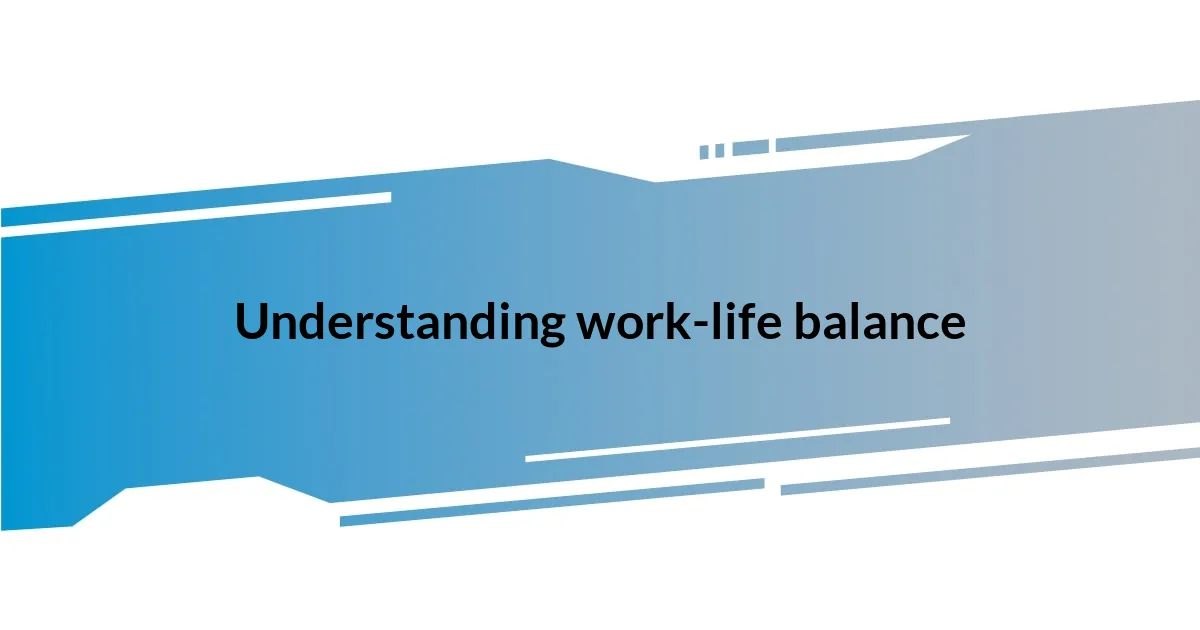
Understanding work-life balance
Work-life balance is more than just a buzzword; it’s a crucial aspect of our well-being. I remember when I first started my career, I believed that working late was a sign of dedication. Eventually, I realized that sacrificing my personal time was draining my spirit. Isn’t it interesting how we sometimes equate busyness with success, only to find ourselves exhausted and unfulfilled?
Finding that ideal blend of work and personal life takes time and reflection. I’ve learned to set boundaries, like not checking emails after a certain hour. It felt liberating when I decided to prioritize family dinners over finishing late projects. Have you ever had an “aha” moment when you realized that balancing these two realms might just be the key to truly enjoying life?
Emotional health is intertwined with work-life balance. One time, after a particularly stressful week, I chose to spend the weekend unplugged from my phone. That simple act transformed my mood, allowing me to reconnect with hobbies and loved ones. It made me wonder: what small changes could you make to nurture your own emotional well-being while achieving balance?
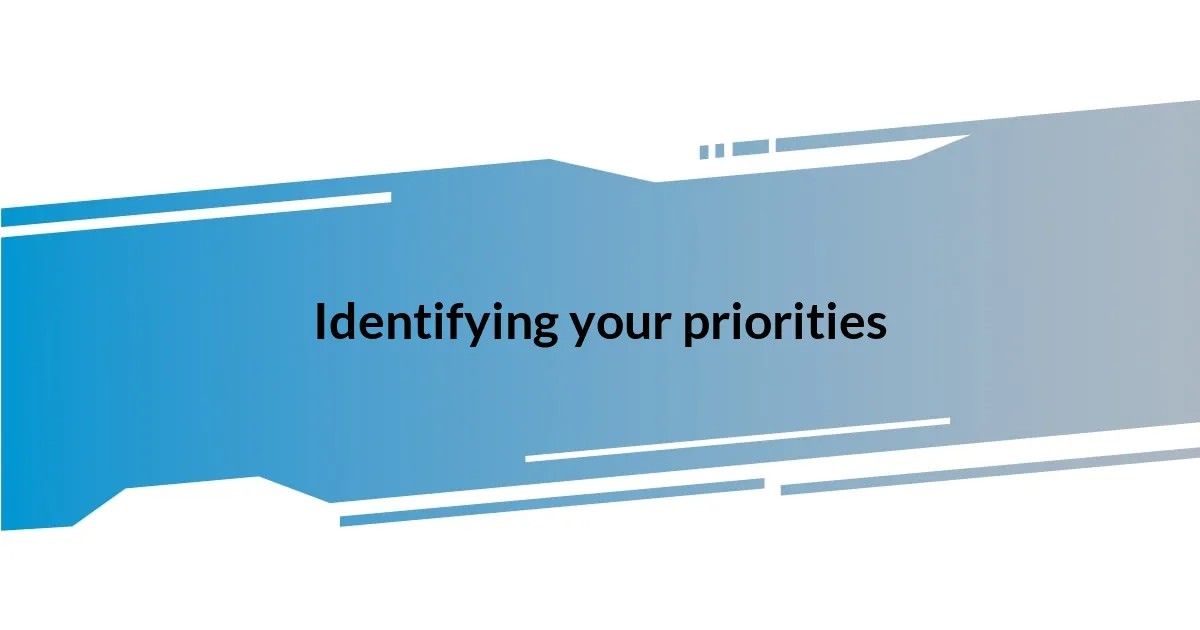
Identifying your priorities
Identifying what’s truly important in your life can feel a bit like searching for a needle in a haystack. I remember sitting down one evening with a cup of tea, trying to list my priorities. It was eye-opening to see clarity emerge from that chaotic list of tasks—a reminder that time spent on what I value most enriches my life’s tapestry.
When I took a closer look at my daily routine, I realized that some activities drained my energy instead of replenishing it. For instance, I used to spend hours on social media while telling myself it was a way to stay connected. But when I compared that with the joy I felt from an afternoon spent painting or enjoying a long walk, it became clear: creative pursuits fueled my spirit far more than scrolling ever could.
Creating a clear comparison can also help sharpen your focus on priorities. I find it beneficial to assess my commitments regularly, as this practice keeps me grounded. It makes a difference to visually map things out. Here’s how I like to break it down:
| Low Value Activities | High Value Activities |
|---|---|
| Endless email checking | Family game nights |
| Scrolling social media | Art and hobbies |
By identifying what matters most, I’ve been able to cultivate a fulfilling balance—one that nurtures both my career aspirations and personal joys.
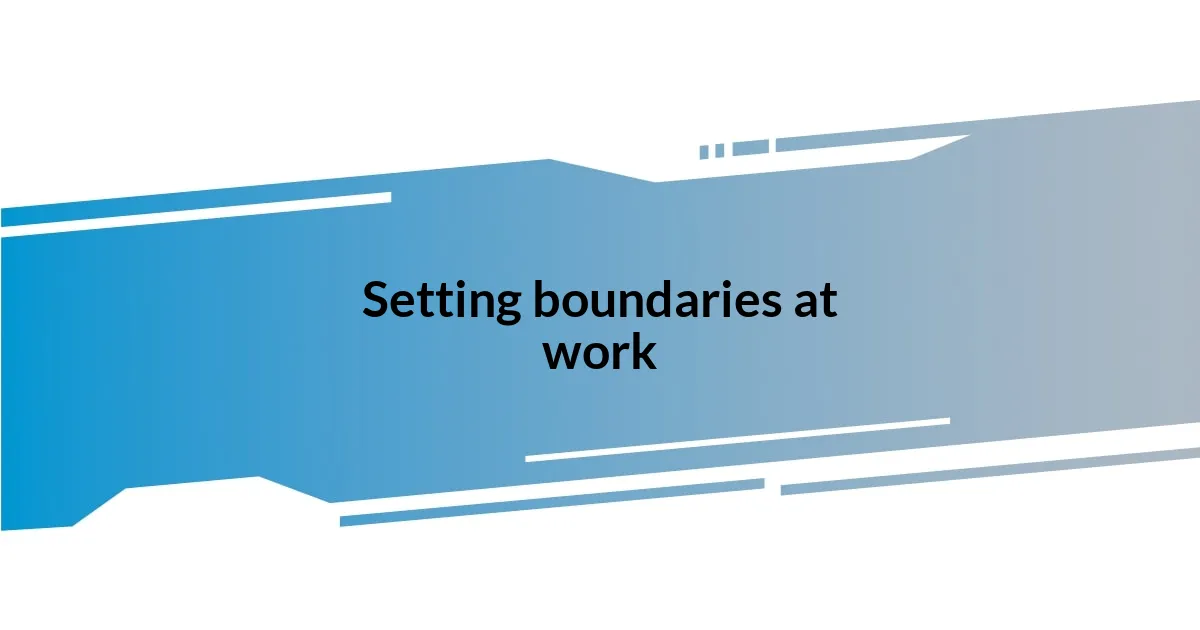
Setting boundaries at work
Setting boundaries at work is fundamental in maintaining a harmonious work-life balance. I once found myself drowning in unexpected late-night meetings, only to wake up with a sense of dread for another chaotic day ahead. That’s when I began implementing strict hours: the moment the clock struck five, I powered down my laptop and stepped away. It was a radical shift—but what a relief it was to reclaim my evenings!
To effectively set boundaries, here are some strategies I found helpful:
- Communicate Expectations: Make it clear to your colleagues and supervisors when you’re available and when you’re off the clock.
- Say No: I learned to decline requests that infringe on my personal time, which took practice but was ultimately empowering.
- Create a Ritual: Whether it’s shutting down your workspace or taking a short walk, establish a routine to signify the end of your workday.
- Limit Digital Devices: I set a rule of leaving my phone in another room during family time, and it made all the difference in being present.
- Hold Yourself Accountable: Having a trusted friend or colleague to check in with on your progress makes setting boundaries more manageable.
Implementing these strategies transformed my relationship with work. I began to see my job not as the center of my universe, but as a part of a bigger picture—one that included my happiness and well-being.
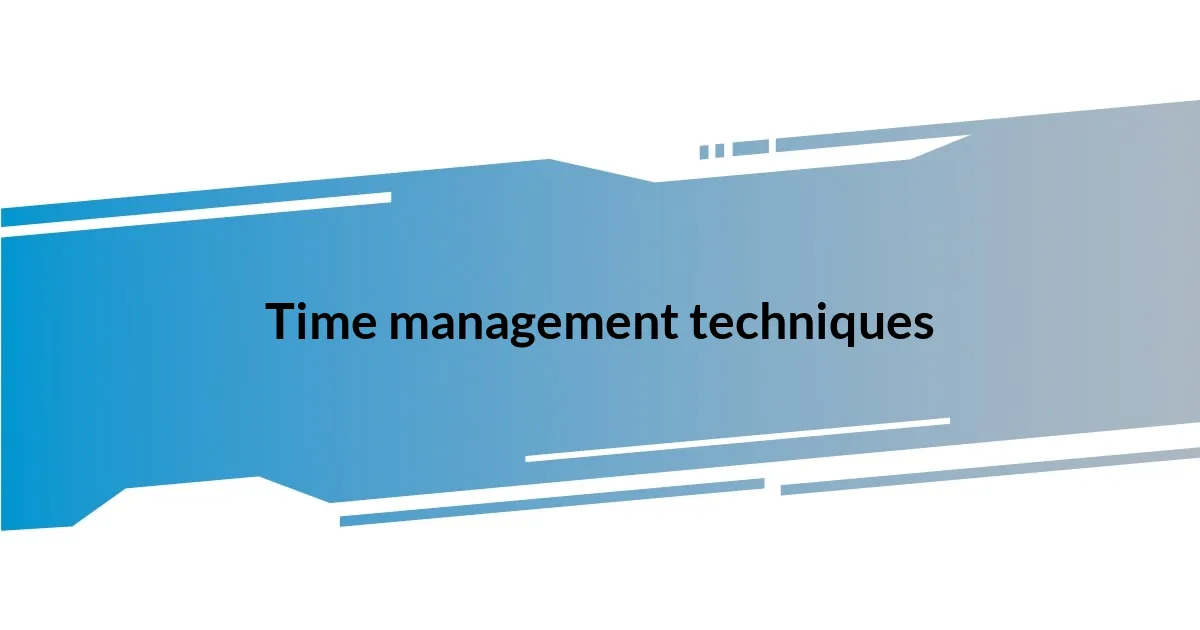
Time management techniques
Time management techniques can greatly influence how we balance our daily responsibilities. One of the strategies that I’ve found particularly valuable is time blocking. This involves dedicating specific chunks of time for particular tasks or activities throughout my day. For example, I usually set aside two hours in the morning solely for focused work, free from distractions. It’s amazing how much I can accomplish when I have that structure! Have you ever tried this approach? I’d recommend experimenting with it to see how it reshapes your productivity.
Another method I enjoy is the Pomodoro Technique, which surprisingly transformed how I tackle projects. This technique consists of working for 25 minutes, followed by a 5-minute break. At first, I thought it would be too rigid, but I soon discovered it energizes me! Those short breaks allow my mind to recharge, making my work feel more manageable and enjoyable. Plus, I often return to my tasks with fresh ideas and renewed focus. It’s a small commitment that has reshaped my workflow—and it may do the same for you.
Lastly, I can’t stress enough how important it is to review my day regularly. Each evening, I take a few moments to assess what I accomplished and where I can improve. This practice not only helps clarify my goals for the next day but also keeps my motivation high. There’s something about visually tracking progress that fills me with a sense of achievement. Have you ever evaluated your day like this? If not, give it a shot—it’s a small adjustment that can lead to a big difference in how you manage your time.
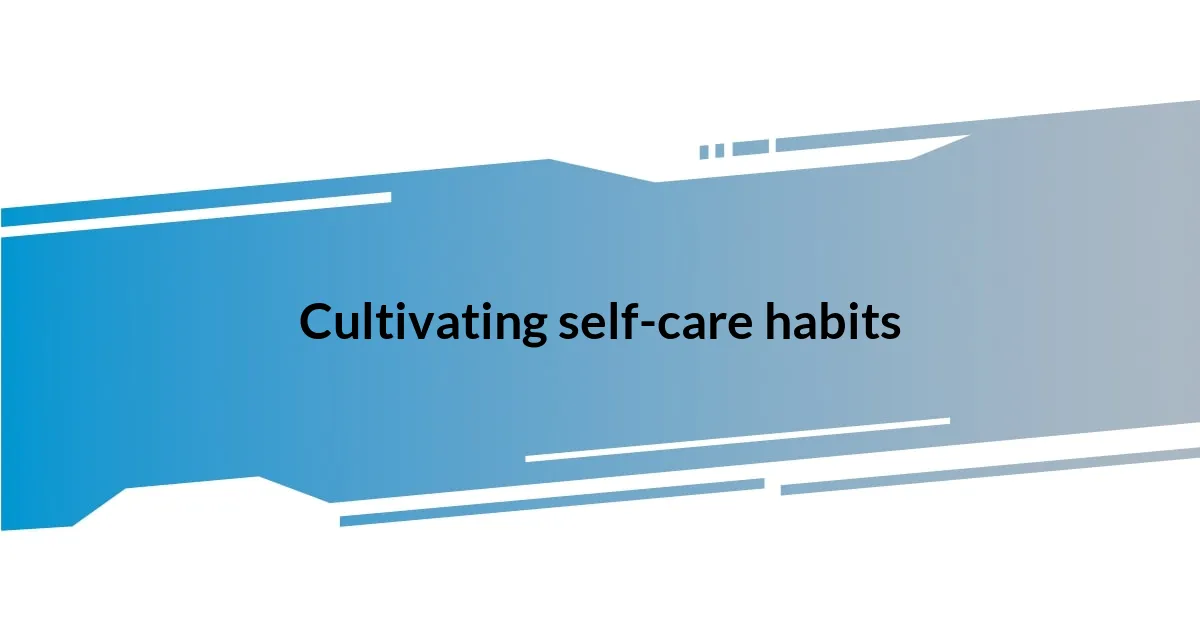
Cultivating self-care habits
Cultivating self-care habits has been a game changer for me, particularly during hectic work weeks. I realized that my mental health shouldn’t take a backseat to my job. Incorporating simple rituals like morning meditation and evening gratitude journaling has noticeably shifted my mindset. Have you ever experienced the power of reflection? These moments remind me of what’s truly important and ground me when life feels chaotic.
Another habit I’ve embraced is setting aside “me time”—even when I felt too busy. It started with a 20-minute walk during lunch, which seemed trivial at first. Yet, I found that these brief breaks not only boosted my energy but also cleared my mind. It’s surprising how stepping outside, breathing fresh air, and disconnecting can spark new ideas. Have you ever stepped away from your desk just to breathe? That little act can ignite inspiration!
Finally, I can’t underestimate the importance of nurturing hobbies that aren’t work-related. For me, it’s painting. Diving into creativity lets me escape the demands of the office and express myself. I often lose myself in colors and canvases, feeling revitalized afterward. Isn’t it fascinating how creativity can recharge our spirits? I encourage you to explore what hobbies resonate with you; self-care isn’t merely a checklist—it’s about discovering joy in the activities that light you up.
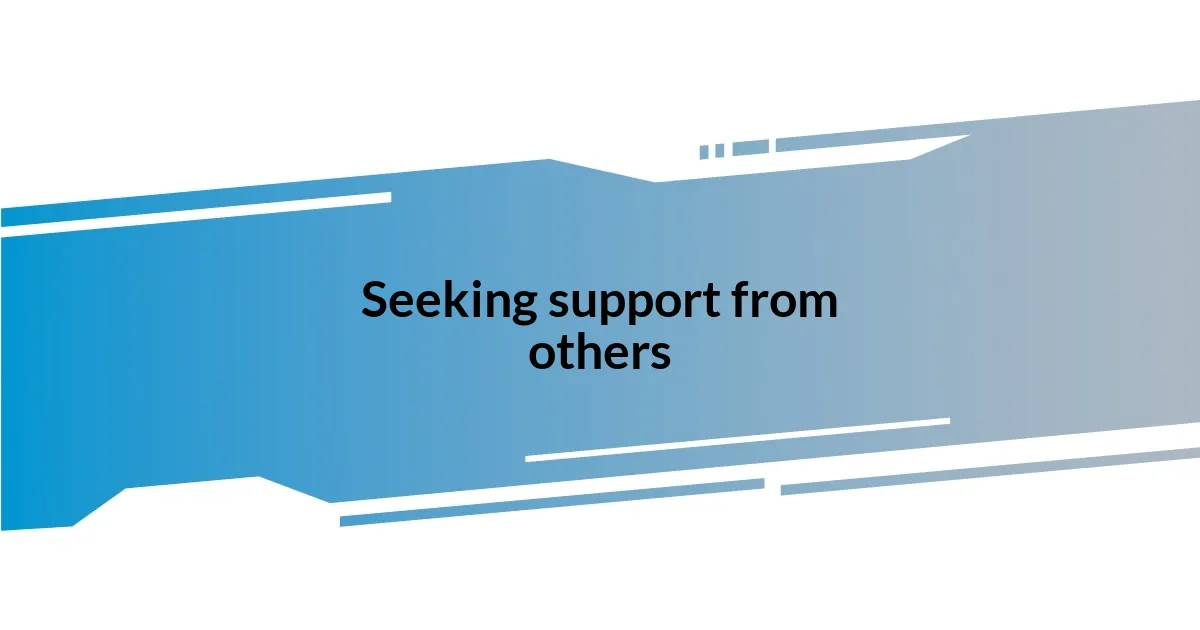
Seeking support from others
Seeking support from others has profoundly shaped my journey toward achieving work-life balance. I still remember the first time I reached out to colleagues for help. It was during a particularly demanding project, and rather than struggling alone, I organized a group brainstorming session. The synergy of ideas and encouragement we generated made a significant difference—not just in the work but also in building connections that eased my stress. Have you ever thought about how powerful teamwork can be?
I’ve also discovered that talking about my challenges with friends and family offers a unique perspective I might have overlooked. When I opened up about my struggles balancing commitments, my best friend shared her experiences and coping strategies. It was like a light bulb moment for me; I realized I wasn’t alone in this. Have you found that sharing your worries can lighten the load? It’s astonishing how vocalizing our experiences not only builds empathy but can also forge stronger bonds with those we care about.
Moreover, seeking professional guidance, like mentorship or coaching, can be invaluable. I once engaged with a mentor who provided insight into managing my workload and emotional well-being. Our conversations sparked new ways of thinking about my priorities, and I learned to set boundaries that felt authentic to me. Have you considered who might be a mentor in your life? Sometimes, just a fresh perspective is all it takes to navigate the complexities of work and personal commitments more effectively.
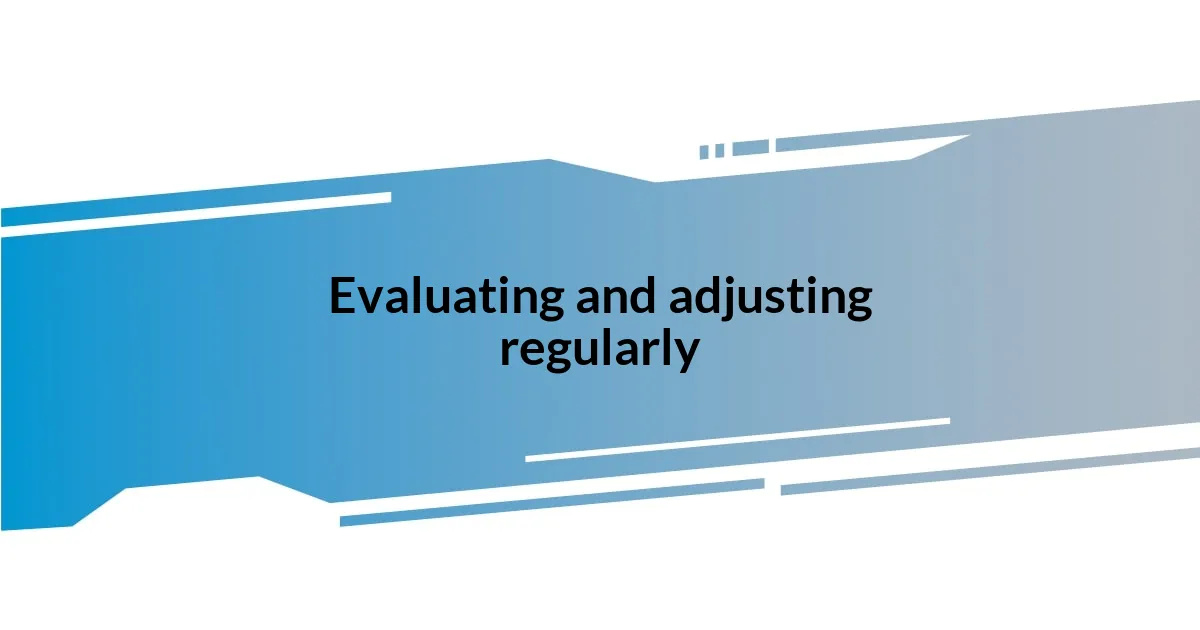
Evaluating and adjusting regularly
Evaluating my work-life balance has become an ongoing practice that I personally value. I routinely check in with myself to see how I’m feeling about work, personal time, and overall happiness. I remember one week when I felt overwhelmed; it hit me that I hadn’t taken a step back to reflect on my priorities. Have you ever felt that pressure build up without realizing it? That moment taught me the importance of regular evaluations—it’s like a mini-reset that keeps me aligned with my goals.
Keeping a flexible mindset is just as critical. After my self-checks, I often find areas where adjustments are needed. For instance, I might notice that I’m spending too much time on work projects and not enough with family—or vice versa. Last month, I decided to shift how I structure my evenings, dedicating two nights a week for family activities instead of late work sessions. This not only re-energized our family dynamic but also refocused my professional efforts—remarkable what a little change can do, don’t you think?
I believe in setting small, achievable goals for myself during these evaluations. For example, I started tracking my productivity and relaxation time. It sounds simple, but seeing the numbers helped me realize when I was overcommitting. After a particularly busy stretch, I adjusted my calendar to include short breaks throughout the day. Those five-minute pauses have revitalized my creativity and patience remarkably. Have you tried incorporating small shifts like this to enhance your own balance? It can bring surprising clarity and joy back into your routine.